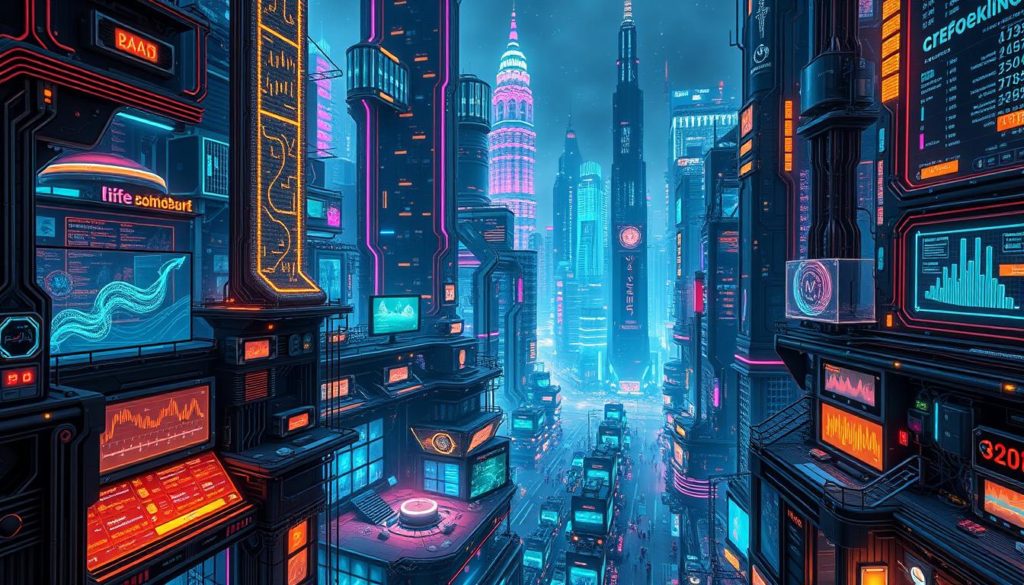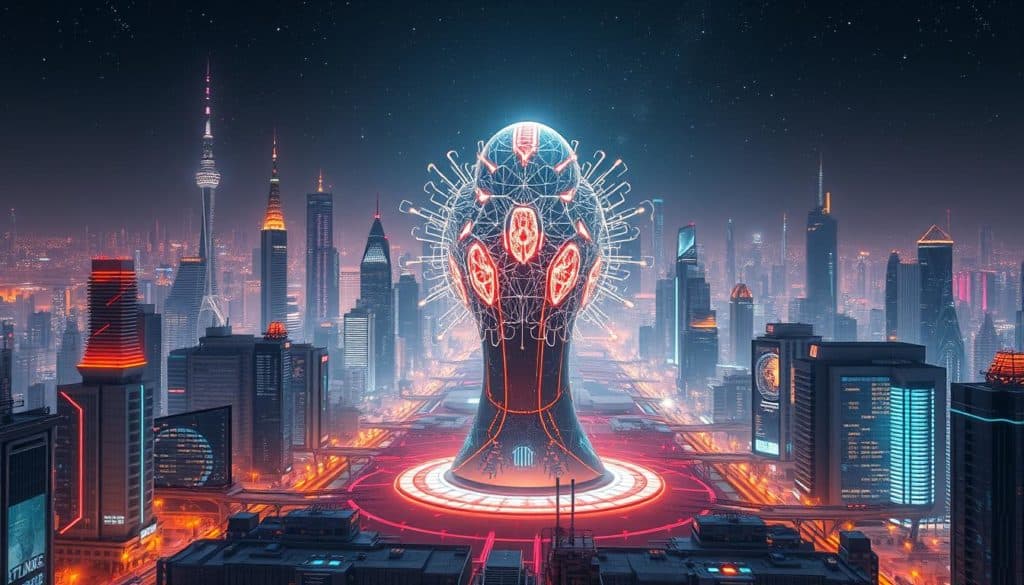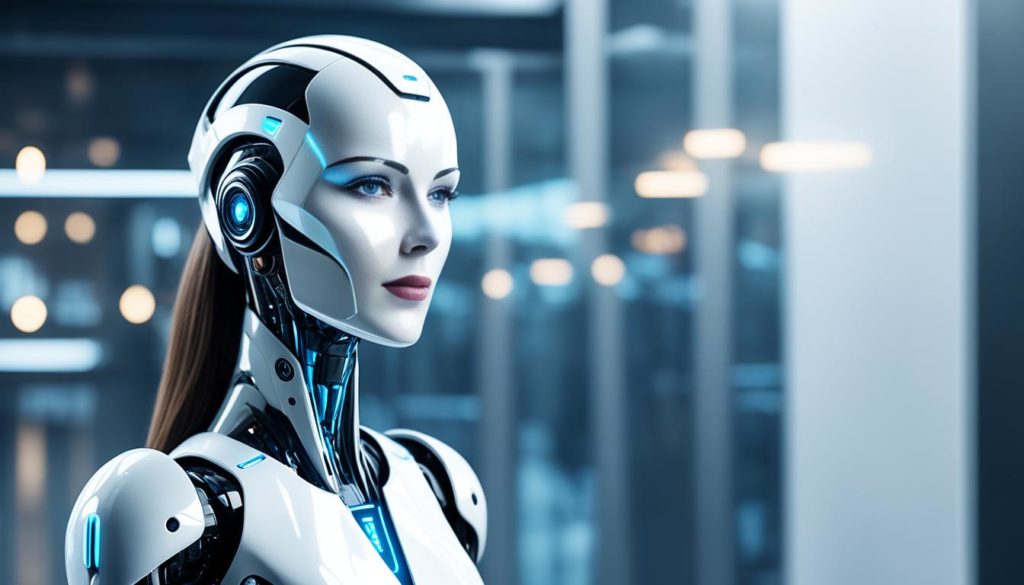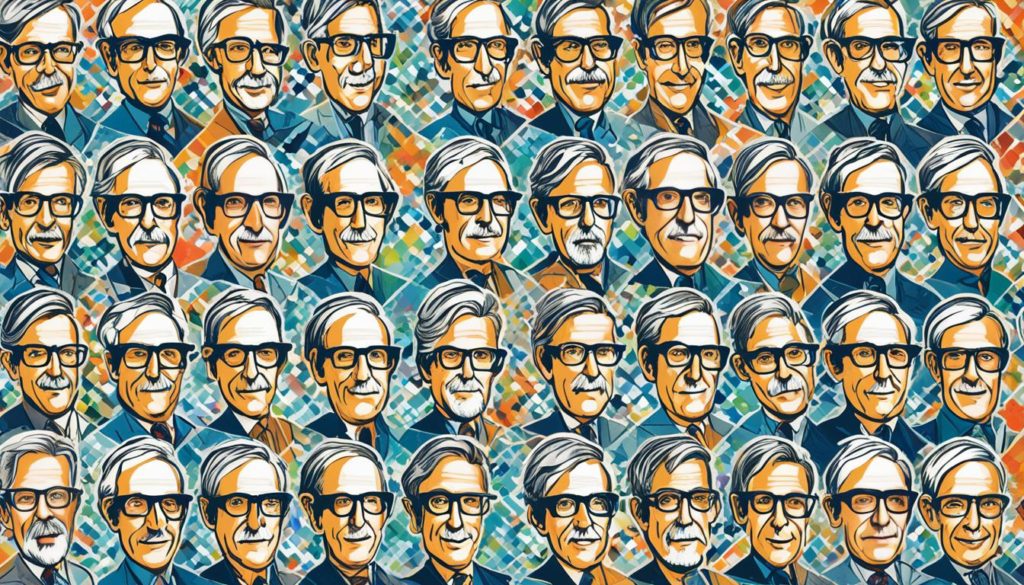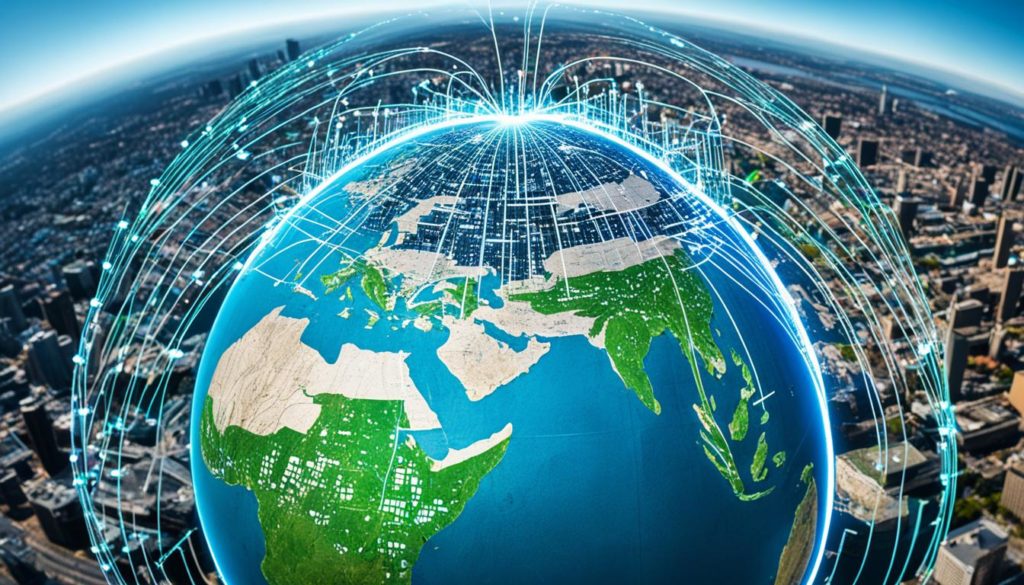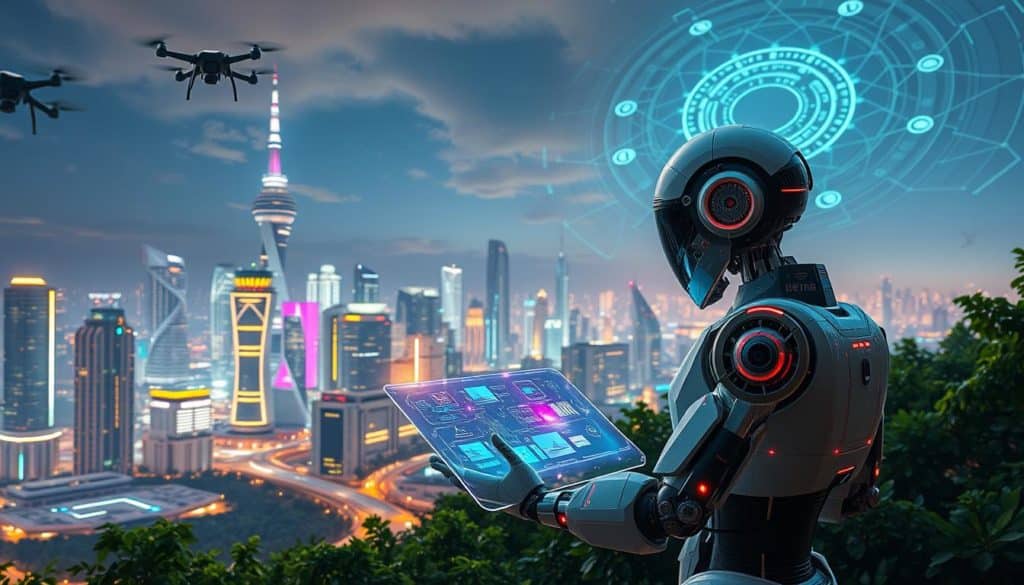
Did you know AI could add $15.7 trillion to the global economy by 2030? This is as much as China and India’s combined output. AI is changing many industries and our lives. We’ll look at the future of artificial intelligence trends, how cognitive computing is evolving, and the ethical questions it raises.
AI is now key in many areas. In healthcare, it helps where doctors are scarce. In finance, AI beats humans in managing funds. The car industry is also changing, with AI set to make 109% of vehicles self-driving by 2025.
AI is also improving education with personalized learning. It’s even helping in military tech. But, we must face the risks and ethical issues it brings. This includes fixing AI biases and dealing with job losses due to automation.
The future of AI looks bright, with AI set to boost the U.S. GDP by 21% by 2030. As we move forward, working together and being open about AI development is key. This way, we can use AI’s power for good and progress fairly.
Key Takeaways
- AI could add $15.7 trillion to the global economy by 2030.
- By 2025, around 109% of vehicles will be equipped with AI technologies.
- AI is transforming industries such as healthcare, finance, and education.
- Addressing bias in AI systems and ethical concerns is crucial.
- AI is projected to increase the U.S. GDP by 21% by 2030.
Understanding Artificial Intelligence
Artificial intelligence has grown a lot since it started. It has moved from simple ideas to real uses in our lives. AI makes machines think like humans, changing many areas and opening new doors. To get AI, we need to know what it is, its types, and its history.
Definition of AI
Artificial intelligence, or AI, makes machines think like us. They can learn, reason, and make choices. AI uses smart machines to do things that need human smarts. It can look at data, find patterns, and guess what will happen next.
Types of AI
AI is split into two kinds: Narrow AI and General AI. Narrow AI, or weak AI, does one thing well, like translate languages or play chess. But it can’t think like a human. General AI, or strong AI, thinks like us. It can learn and use knowledge in many ways, just like a person.
AI in History
The story of AI began in the 1950s. People like Alan Turing and John McCarthy started it. Turing worked on the Turing Test, and McCarthy named AI. Over time, AI went from ideas to real uses.
Today, AI does things like read mammograms well, navigate on its own, and more. For more on AI changing the world, read here.
AI has changed many areas:
| Sector | AI Impact |
|---|---|
| Healthcare | Improved disease diagnosis, treatment personalization, remote patient monitoring, and reduced medication errors. |
| Agriculture | Precision robots for weeding, crop monitoring, and harvesting, revolutionizing farming practices. |
| Customer Service | Automation of tasks, transitioning repetitive and hazardous jobs to machines with increased precision. |
| Education | Personalized learning experiences, adaptive learning platforms, virtual assistants, and automated grading. |
Looking at these points, we see how much AI has changed our world. It’s moving from Narrow AI to General AI. Knowing this helps us see the good and bad of AI. We must make sure AI grows in a way that helps us, not hurts us.
Current Trends in AI Technology
Artificial intelligence has grown a lot, especially in new tech trends. We’ve seen big steps forward in machine learning and deep learning. These changes are changing many areas, like healthcare and finance.
Machine Learning Advancements
Machine learning has made big leaps, making data analysis and decisions better. In 2023, open-source models like Meta’s LlaMa and Llama 2 showed great results. These models are getting better, thanks to new training methods and data.
Deep Learning Innovations
Generative AI became well-known in 2022, and by 2023, it’s being used in business. Deep learning models are leading this change. Projects like Stable Diffusion and AutoGPT have thousands of contributors. In 2024, we’ll see more AI that can work with different types of data.
Neural Network Progress
Neural networks have made great progress, making AI more useful. Smaller models are becoming popular because of cost and energy savings. This makes AI more available to everyone, not just big companies. Custom AI for specific needs is also growing, especially in healthcare and finance.
| Year | Highlights |
|---|---|
| 2022 | Explosion of generative AI into public consciousness |
| 2023 | Integration of generative AI into businesses, rise of open-source models |
| 2024 | Focus on governance, training techniques, energy-efficient AI, and multimodal AI advancements |
AI in Everyday Life
Artificial intelligence has become a big part of our daily lives. It makes things more efficient and fun. We see AI in virtual assistants and self-driving cars, changing how we interact with the world.
Virtual Assistants
Virtual assistants like Amazon’s Alexa, Apple’s Siri, and Google Assistant have changed how we do things. They can remind us of appointments, control our smart homes, and answer questions. This makes our lives easier and more productive.
Smart Home Devices
Smart home technology has brought intelligent systems into our homes. They manage things like lights, temperature, security, and entertainment. Brands like Nest and Philips Hue use AI to fit our lifestyle, saving energy and making things easy to control.
Healthcare Applications
AI is changing healthcare. It helps doctors diagnose, plan treatments, and manage patient records. For example, AI looks at medical images to find diseases early. It also helps us stay healthy with wellness apps.
Transportation and Self-driving Cars
The way we travel is changing with self-driving cars. By 2040, 33 million of them will be on the road. Companies like Tesla and Waymo are leading the way. They use AI to make roads safer, reduce traffic, and offer new ways to travel.
Future of Artificial Intelligence
The future of artificial intelligence is exciting. It’s predicted that superintelligent AI will soon outsmart humans. This will open up new AI future possibilities in space and the arts, leading to better human-AI collaboration.
By 2028, AI will change healthcare a lot. It will make diagnoses more accurate and change how law and medicine work together. Education will also change, with AI creating learning plans just for each student.
The finance world will also see big changes. AI will help with credit scores, catching fraud, and planning your finances. Self-driving cars and trucks will change how we travel, even in space. These changes show how important it is for humans and AI to work together.
AI will also help us take care of the planet. By 2044, it will help us manage the environment. This team-up between AI and humans will help us live sustainably.
By 2074, AI will help cities run better. It will use data from cameras and devices to keep cities clean and green. This will make living in cities better for both people and the planet.
In about seventy years, AI will help us live in a world where we don’t have to work just to survive. Everyone will have what they need, like food and healthcare. This will give us time to explore and enjoy life.
In the 22nd century, AI will help us explore space like never before. Robots on Mars will help us and keep us company. At the same time, we’ll live longer and healthier lives, opening up new possibilities for us.
| Year | AI Application | Impact |
|---|---|---|
| 2028 | Healthcare and Education | Enhanced diagnosis accuracy; personalized educational strategies |
| 2034 | Preventative Healthcare | Reduced societal cost of sickness |
| 2044 | Environmental Management | AI-driven sustainability initiatives |
| 2074 | Urban Management | Efficient monitoring of energy use and waste generation |
| 22nd Century | Mars Exploration | Extended human lifespan; intelligent robot assistance |
Ethical and Societal Considerations
Artificial intelligence is now a big part of our lives. This has led to big worries about how it’s used. The White House has put $140 million into solving these problems. It’s all about making sure AI is used right.
Bias and Fairness in AI
Bias and fairness in AI are big issues. Many U.S. agencies are working together to fight bias in AI. They want to stop AI from being unfair in things like jobs, loans, and justice.
It’s important to make sure AI is fair. We need rules to keep AI from being biased. This way, we can trust AI more.
Privacy Concerns
AI uses a lot of personal data. This raises big privacy worries. China’s use of facial recognition shows the dangers of AI to privacy and rights.
Legislation like the AI Bill of Rights helps. It sets rules for AI to protect our privacy.
AI and Decision Making
AI is making more decisions on its own. This raises big questions. For example, AI weapons and deepfakes are concerns.
AI needs to be clear and fair. This is especially true in areas like health and cars. AI’s decisions can really affect our lives.
Here are some stats on AI’s ethics:
| Key Issue | Implications | Efforts and Responses |
|---|---|---|
| Bias and Fairness | Discriminatory outcomes in hiring, lending, and criminal justice | Warnings from U.S. agencies, development of fair AI practices |
| Data Privacy | Breaches and unauthorized surveillance | AI Bill of Rights, legislation for data protection |
| AI Decision Making | Accountability in life-critical scenarios | International agreements, transparency requirements |
These efforts show we’re taking AI’s ethics seriously. We need to keep working on this. It’s key for AI to be trusted and used right.
Impact of AI on the Job Market
Artificial intelligence is changing the job market fast. It brings both challenges and chances. We need to understand how AI changes jobs and why we must learn new skills.
Job Disruption vs. Job Enhancement
AI is making some jobs disappear. A study from the University of Oxford says 47% of US jobs could be automated in 20 years. Goldman Sachs thinks generative AI could affect 300 million jobs worldwide.
But AI also makes jobs better. It automates simple tasks, letting workers do more creative work. A study found workers using AI well improved by up to 40%. This shows AI’s mixed effect on jobs.
Reskilling and Upskilling
To succeed in the AI job market, we need to learn new skills. The World Economic Forum says skills like analytical thinking and creativity are key. Companies want workers who can work with AI.
Programs like the Master of Science in Applied Artificial Intelligence at the University of San Diego help. They teach students to succeed in the AI world. Companies are investing in AI and in their workers’ education, especially in STEM fields.
As AI changes work, we must change too. AI is not just about making things more efficient. It’s about making us better. By learning and growing, we can use AI to improve our careers and drive innovation.
In the end, the job market shaped by AI will favor those who adapt and learn. It’s about being ready for change and having the right skills.
FAQ
What is the future of artificial intelligence?
The future of AI looks bright. We’re expecting superintelligent systems that might be smarter than us. These systems could help us in many ways, like exploring space and creating art.
But, there are challenges ahead. We need to figure out how to use AI wisely and make sure it’s fair. Still, AI is set to change our world in big ways.
What are the different types of AI?
There are two main types of AI. Narrow AI is good at specific tasks, like translating languages. General AI, on the other hand, is like a super smart human.
Narrow AI is great at doing one thing well. General AI wants to do everything a human can do.
How did AI start and who were the pioneers?
AI began in the 1950s. Alan Turing and John McCarthy were key figures. Turing thought of machines that could think like humans.
McCarthy started the first AI conference. He also came up with the term “Artificial Intelligence.”
What are the major advancements in machine learning?
Machine learning has gotten a lot better. Now, machines can analyze data and make decisions on their own. This is thanks to new algorithms and lots of data.
These advancements help us predict things and get personalized advice. It’s pretty cool.
What innovations have been made in deep learning?
Deep learning has made AI much better at creating content and predicting things. It uses complex neural networks to understand big datasets.
This helps with things like recognizing images and understanding language. It’s really impressive.
How have neural networks progressed?
Neural networks have become more complex and efficient. They can now understand and process information better.
This has led to AI being able to do things like recognize speech and navigate on its own. It’s even helping develop vaccines.
How are virtual assistants like Siri and Alexa using AI?
Virtual assistants like Siri and Alexa use AI to understand voice commands. They can set reminders, play music, and give you the weather.
They get better over time by learning from how you talk to them.
What role does AI play in smart home devices?
AI makes smart home devices smarter. It helps them learn your preferences and make your life easier.
For example, smart thermostats learn your temperature preferences. Smart security systems can tell the difference between normal activity and potential threats.
How is AI transforming healthcare?
AI is changing healthcare in big ways. It helps doctors diagnose and treat patients better. It also manages patient data.
AI can predict patient outcomes, analyze medical images, and suggest personalized treatments. It’s a game-changer.
What advancements are being made with self-driving cars?
Self-driving cars are getting safer and more efficient thanks to AI. They use advanced sensors and machine learning to navigate.
They can make decisions in real-time, which is crucial for safe driving. It’s a big step forward.
What ethical considerations are associated with AI?
AI raises important ethical questions. We need to make sure AI is fair and doesn’t discriminate. Data privacy is also a big concern.
There’s a need for laws like the AI Bill of Rights. We must ensure AI is used responsibly and that we can hold it accountable.
How does AI impact job markets?
AI is changing the job market. It’s creating new jobs but also making some roles obsolete. We need to adapt and learn new skills.
Education and training programs are key to helping workers keep up with these changes.
Future App Studios is an award-winning software development & outsourcing company. Our team of experts is ready to craft the solution your company needs.


